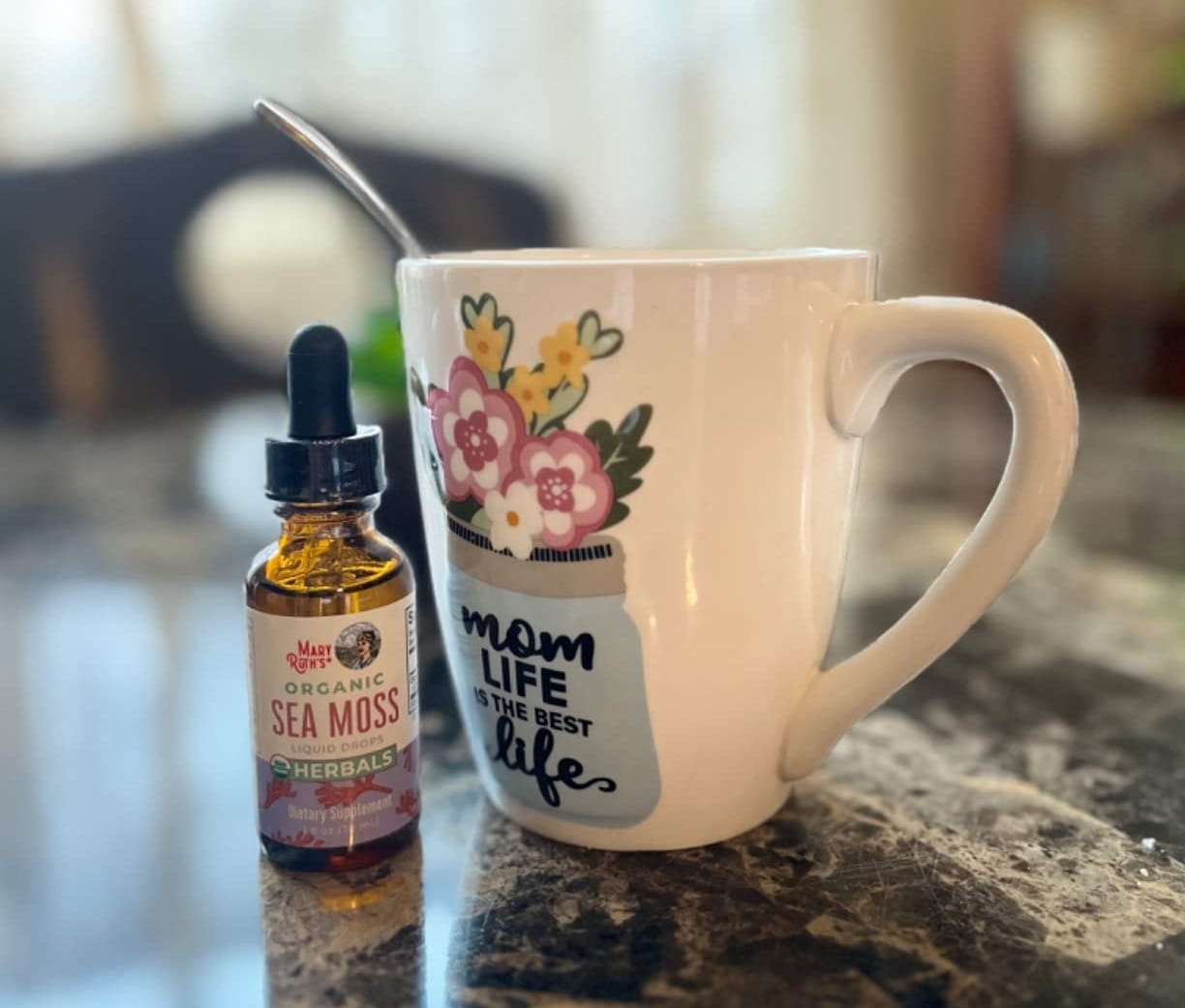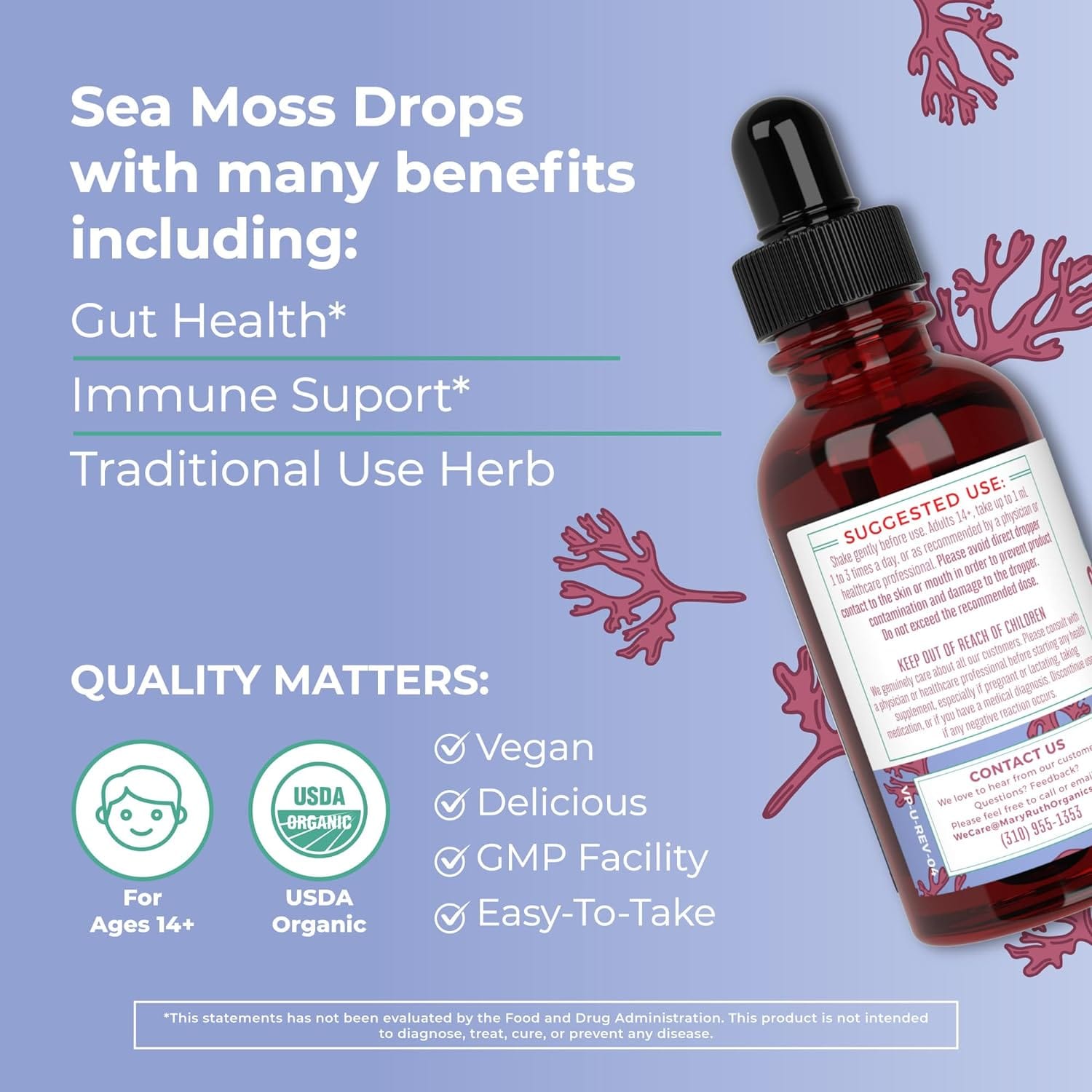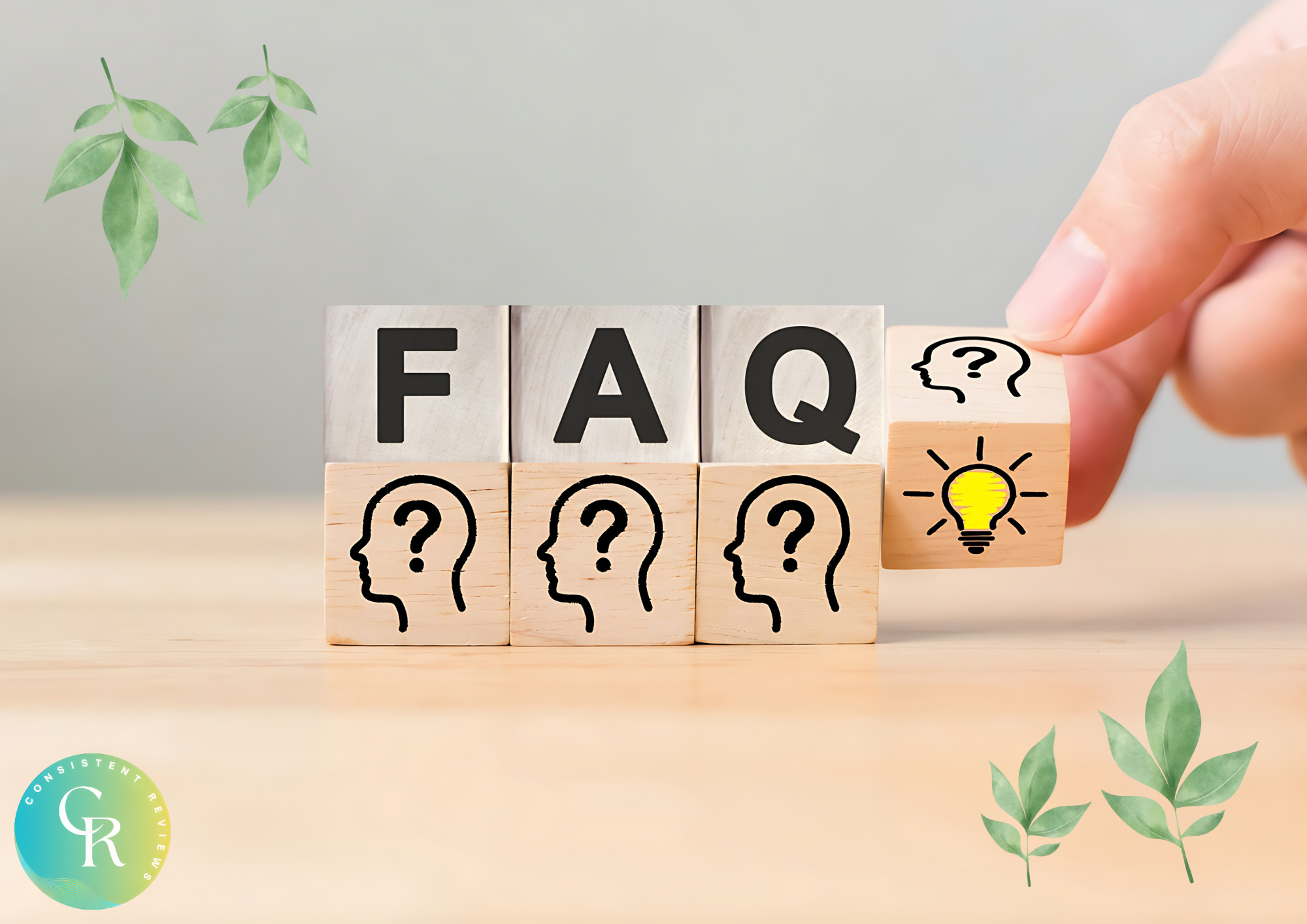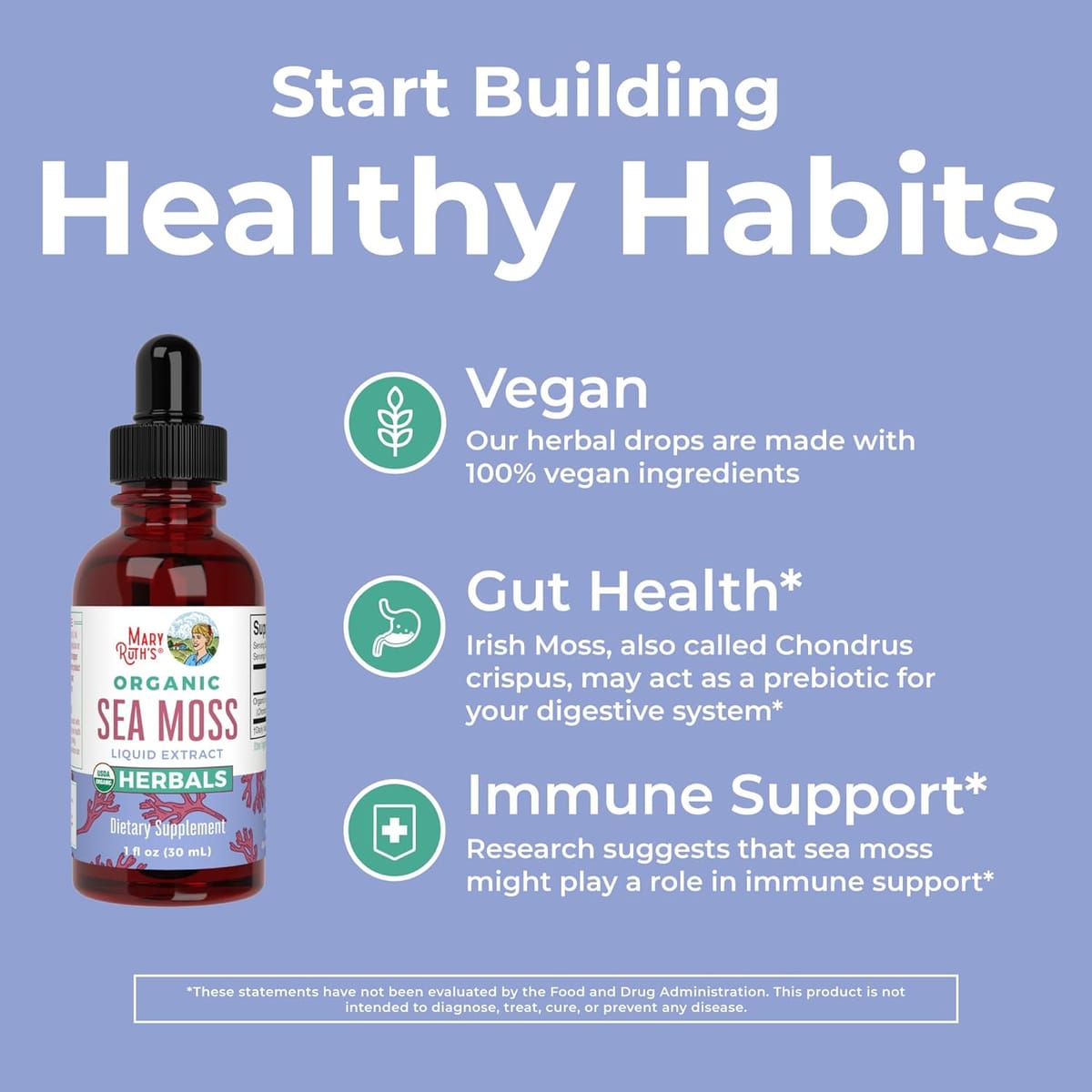Key Takeaways:
- Understanding the potential side effects of sea moss drops is crucial for safe consumption.
- Excessive intake of sea moss can lead to complications, particularly due to its high iodine content.
- Consultation with a healthcare professional is recommended before adding sea moss to your diet, especially for individuals with pre-existing health conditions.
Sea moss, also known as Irish moss, is a type of red seaweed that has recently gained popularity for its numerous health benefits. It is commonly consumed in various forms, including gel, powder, pills, and drops. While sea moss is generally safe for most people, it is important to be aware of the potential side effects associated with its consumption. This article will explore the side effects of sea moss drops, focusing on the implications for thyroid health, gut health, and the immune system, among others.
The Rising Popularity of Sea Moss Supplements

Sea moss supplements, including sea moss drops, have become a trendy addition to health and wellness routines. With claims of boosting immune system function and providing essential vitamins, many individuals are incorporating sea moss into their diets. However, as with any dietary supplement, it is important to understand the potential risks and how much sea moss is safe to consume.
Iodine Content in Sea Moss: A Double-Edged Sword
One of the key components of sea moss is iodine, an essential mineral necessary for proper thyroid function. While iodine deficiency can lead to health problems, consuming excessive amounts of iodine through sea moss drops can also have serious adverse effects. It is crucial to balance iodine intake to avoid issues such as thyroid hormone imbalance or iodine poisoning.
Thyroid Health and Sea Moss Consumption
The thyroid gland relies on iodine to produce thyroid hormones, which regulate metabolism, growth, and development. Introducing sea moss into your diet can support thyroid health, but excessive iodine intake from too much sea moss can lead to an overactive thyroid or exacerbate pre-existing thyroid conditions.
Potential for Excessive Iodine Intake
Sea moss contains significant amounts of iodine, and consuming sea moss drops without monitoring intake can lead to excessive iodine intake. This can result in symptoms such as stomach pain, nausea, and even more severe conditions like thyroiditis or hyperthyroidism, as documented in the European Thyroid Journal.
Interactions with Medications
Individuals taking iodine supplements or thyroid medications should be cautious when adding sea moss to their diet. Sea moss's high iodine content can interact with these medications, potentially leading to an imbalance in thyroid hormones. Additionally, sea moss's blood thinning properties may interfere with blood thinner medications.
Sea Moss and Gut Health

Sea moss is often touted for its benefits to gut health due to its high fiber content. However, for some individuals, eating sea moss, especially in large quantities, can lead to digestive issues such as bloating or stomach pain. It is important to start with small amounts when introducing sea moss to your diet to assess tolerance.
Allergic Reactions and Sea Moss
Severe allergic reactions to sea moss are rare but possible. Symptoms can range from mild skin rashes to more severe reactions requiring medical attention. If you experience any signs of an allergic reaction after taking sea moss, it is advised to avoid sea moss altogether and consult a healthcare provider.
Sea Moss and Dietary Supplement Regulation
The dietary supplement industry, which includes products like sea moss pills and sea moss powder, is subject to different regulations than pharmaceuticals. This means that the concentration of active ingredients, such as iodine, can vary significantly between batches and brands. Consumers looking to take sea moss should be aware that the lack of stringent regulation can lead to inconsistencies in product quality. It's not uncommon for some supplements to contain too much iodine or be contaminated with heavy metals, which are naturally found in the ocean and can be absorbed by edible seaweeds like sea moss.
In light of these regulatory challenges, consumers must conduct thorough research on brands and seek out third-party testing when available. Reputable companies often provide certificates of analysis (COAs) that detail the levels of iodine, heavy metals, and other compounds present in their products. When considering sea moss as a dietary supplement, it's advisable to opt for products that have been tested for purity and potency to minimize the risk of excessive consumption and potential side effects.
The Comparative Benefits of Different Sea Moss Forms
Sea moss comes in various forms, including raw sea moss, dried sea moss, sea moss powder, and sea moss pills. Each form offers unique benefits and may cater to different preferences or lifestyles. Raw sea moss is the whole, unprocessed seaweed, that can be used to make gels or added directly to foods. It's often touted for its minimal processing, which may preserve more of its natural nutrients. Dried sea moss, on the other hand, is convenient for storage and can be rehydrated before use, making it a popular choice for those who value shelf-stability.
Sea moss powder and pills offer the convenience of easy dosing and are ideal for individuals who may not enjoy the taste of sea moss but still want to incorporate its benefits into their diet. However, these processed forms may have gone through additional manufacturing steps that could affect their nutrient profile. When deciding to take sea moss, it's important to consider these differences and choose a form that aligns with your dietary needs and preferences. As with any dietary supplements, it's recommended to consult with a healthcare professional, especially for those with pre-existing thyroid conditions or iodine sensitivities.
Sea Moss Drops and Heavy Metal Contamination
The environment in which sea moss grows can affect its purity. Sea moss that is harvested from polluted waters may contain toxic metals, which can lead to health problems when consumed. It is essential to purchase sea moss products from reputable sources that test for heavy metal contamination.
Breastfeeding Women and Sea Moss
Breastfeeding women should exercise caution when consuming sea moss. The potential effects on infants are not well-studied, and the high iodine content could pose risks. Consulting with a healthcare professional before taking sea moss drops is recommended for breastfeeding women.
Sea Moss for Those with Iodine Sensitivity
Individuals with iodine sensitivity or an overactive thyroid should be particularly careful with sea moss consumption. The high iodine content can exacerbate thyroid problems, and in some cases, it may be advisable to avoid sea moss supplements entirely.
Sea Moss and Heart Health
While sea moss has potential benefits for heart health, consuming excessive amounts can have the opposite effect. The iodine in sea moss can influence blood pressure and heart rate, so it is important to monitor intake and consult with a healthcare provider if you have any heart-related health concerns.
Sea Moss Drops vs. Other Forms of Sea Moss
Sea moss drops offer a convenient way to consume this edible seaweed, but they are not the only option. Sea moss gel, powder, and pills are also available, and each form has its own set of considerations regarding dosage and potential side effects.
How to Safely Incorporate Sea Moss into Your Diet
To minimize the risk of side effects, start with a small dose of sea moss and gradually increase as tolerated. It is also advisable to look for products that provide clear dosage instructions and to follow the recommended serving sizes.
The Role of a Healthcare Professional in Sea Moss Consumption
Before introducing sea moss into your diet, especially if you have existing health conditions or are taking medications, consulting with a healthcare professional is crucial. They can provide personalized advice and help you navigate any potential risks associated with sea moss consumption.


Q: Can sea moss drop affect my thyroid?
A: Yes, sea moss drops can affect thyroid function due to their high iodine content. While iodine is necessary for thyroid health, too much can lead to an overactive or underactive thyroid. It is important to monitor your iodine intake and consult with a healthcare professional if you have thyroid issues.
Q: Can sea moss help with weight loss?
A: While there is limited research on the effects of sea moss on weight loss, it may indirectly support weight management. The high fiber content can help you feel fuller for longer and control your appetite. Additionally, its nutrient-dense profile can provide essential vitamins and minerals to support a balanced diet and exercise routine.
Q: Is sea moss safe for pregnant or breastfeeding women?
A: It is recommended for pregnant or breastfeeding women to consult with their healthcare provider before consuming sea moss. While it is generally considered safe, there is limited research on its effects during pregnancy or while breastfeeding.
Q: How should I store my sea moss?
A: It is best to store dried sea moss in an airtight container in a cool, dry place. If using fresh sea moss, it should be stored in the refrigerator and consumed within 3-4 days.
Q: Can I use sea moss as a substitute for gelatin?
A: Yes, you can use sea moss gel as a substitute for traditional gelatin. Sea moss is naturally rich in carrageenan, which acts as a gelling agent when mixed with water. This makes it a great vegan alternative to gelatin.
Q: How can I avoid the side effects of sea moss drops?
A: To avoid the side effects of sea moss drops, start with a small dose and gradually increase it to assess your tolerance. Ensure you purchase high-quality products from reputable sources, monitor your iodine intake, and consult with a healthcare professional, especially if you have pre-existing health conditions or are taking medications.

Sea moss drops, like any supplement, come with potential side effects that consumers should be aware of. The high iodine content can lead to thyroid imbalances and other health issues if consumed in excess. Interactions with medications, the risk of heavy metal contamination, and the possibility of allergic reactions are also concerns to consider. To enjoy the potential health benefits of sea moss safely, it is important to consume it in moderation, purchase from reputable sources, and consult with a healthcare professional if you have any underlying health conditions or concerns.










